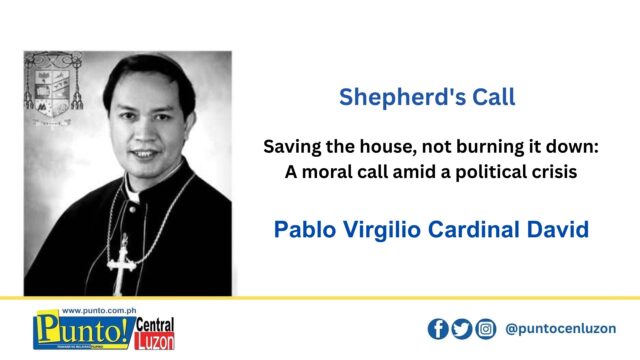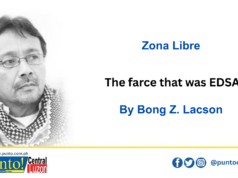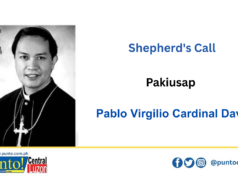IN THE midst of the nation’s latest political turmoil—sparked, ironically, by the President’s own call to investigate corruption—we find ourselves at a moral crossroads. The crisis has revealed both the fragility and the resilience of our democratic institutions. It also confronts us with a question that transcends partisan divides: How do we purge the rot of corruption without destroying the house of democracy that generations of Filipinos have struggled to rebuild?
For decades, our cries of protest – ibagsak! and lansagin! – were formerly directed against oppressive regimes or unjust structures. But today, we raise those same cries in a different spirit. We say ibagsak at lansagin – calling for a dismantling, not of the government itself, but the corrupt networks that have captured and crippled it. We seek not the collapse of the state but its redemption.
As my brother, the sociologist Randy David, reminds us in his PDI Sunday column today (October 12, 2025), “The government of the day—the administration of President Marcos Jr. and Congress—is not the entire state. Its failures may expose flaws in the Constitution, but they do not necessarily undermine the viability of the constitutional state itself.” This distinction is crucial. It means that to criticize, investigate, and hold accountable is not to destroy but to strengthen. To reform is to renew. We do not need to burn the house down to get rid of the rats. It would be folly to throw the baby out with the bath water.
The Church: Its Duty to Provide a Spiritual and Moral Compass for Renewal
From the spiritual and moral standpoint of the Church, corruption is not merely a political sin—it is a spiritual sickness. It erodes trust, breeds cynicism, and kills the soul of the nation. The Gospel warns us that one cannot serve both God and mammon. Despite its own imperfections as a human but divinely designed institution, the Church is called to provide a moral compass in public life, not by claiming political power but by forming consciences, awakening moral courage, and calling people to conversion.
Our faith tradition calls us to the hard work of purification, not annihilation. We recall that after the 1986 People Power Revolution, the Church and the people did not abolish the state; they reclaimed it. We restored democratic institutions that had been desecrated by dictatorship. It would be betrayal of that grace if, in the face of corruption today, we were to abandon democracy in favor of another shortcut—be it a revolutionary government or a civilian-military junta.
The Church, rooted in the hope of resurrection, must remind the nation that institutions can be redeemed. Justice and mercy are not opposites; they are two sides of the same redemptive love that calls sinners to conversion and nations to renewal. Reconciliation, which aims at liberation of conscience, is possible only with confession (the humble admission of truth), contrition (the sincere resolve to make amends) and penance (the readiness to make concrete acts of reparation and restitution).
The Academe: Enlightening the Public Mind
From the perspective of the academe, this crisis is also an educational moment. Corruption thrives in the shadows of ignorance and indifference. Universities and schools have the duty to enlighten public consciousness—to help citizens discern between systemic failure and moral failure, between institutional reform and demagogic revolt.
When we allow political scandals to feed collective despair, we make people vulnerable to authoritarian nostalgia and populist deception. But when we teach discernment, historical memory, and critical thinking, we empower citizens to act wisely and courageously.
The academe must also remind us of irony as a moral teacher of history. There is, indeed, a biro ng tadhana—an irony of fate—that the current president, whose own family’s past history is entangled with corruption and human rights violations, now finds himself compelled to denounce and investigate corruption by both allies and enemies, and human rights violations—such as the killings perpetrated by the previous government. It may be a political move for survival, but even political acts can inadvertently serve the cause of truth. History has a way of forcing even the unlikely to play their part in the moral education and redemption of nations.
Business: Ethical Stewardship of the Common Good
From the standpoint of business, this is not merely a political crisis—it is an economic and ethical one. Corruption, especially in public works and infrastructure, distorts markets, rewards mediocrity, and punishes honesty. It diverts billions from genuine development and drains public confidence in enterprise.
Business leaders must take a stand, not as partisans but as stewards of the common good. True economic progress cannot coexist with systemic plunder. The business sector must commit itself to transparency, compliance, and civic partnership with reform-minded public servants.
The legitimate private sector has no business partnering with political syndicates that turn public funds into private wealth. The time has come to debar contractors and corporations that have colluded in the grand deception of flood-control and infrastructure anomalies. To defend the integrity of markets, we must first defend the integrity of the nation.
Civil Society: Guardians of Accountability
Civil society remains the vigilant conscience of the nation. Its mission is to bridge the moral and institutional gap between the people and the state—to make sure that the law serves justice and that democracy works for the poor.
Today, when opportunists cry for a “revolutionary government” or a “civilian-military junta” under the guise of reform, civil society must expose these for what they are: attempts by discredited dynasties and plunderers to save themselves from accountability. These are the same forces that engineered the so-called “Uniteam” alliance during the last elections—an unholy union of political dynasties now turning against each other for power. When crooks quarrel with crooks, it is not justice but survival they seek.
True unity cannot be built on lies or patronage. As Scripture reminds us, not all forms of unity are good. When the builders of Babel sought to make a name for themselves, God scattered them to prevent the tyranny of false unity. Sometimes, divine disruption is necessary to make way for genuine unity—one that respects truth, justice, and diversity.
Conclusion: Toward a Moral Reconstruction
The challenge before us is clear: to dismantle, not our democratic institutions, but the corruption that corrodes them. This is the moral reconstruction that calls for the convergence of Church, academe, business, and civil society.
We must resist both apathy and anarchy. What the country needs is not another revolution of rage, but a revolution of integrity. We must restore the systems of checks and balances, counteract disinformation, reform the electoral process, end patronage politics and political dynasties, and renew the moral foundations of public service.
We owe it to those who once filled EDSA with candles and prayers, to the young who still believe that decency in governance is possible, and to the God who continues to call this nation to conversion. We do not burn down the house to rid it of rats; we cleanse it, guard it, and make it worthy again of the people it shelters.





